|
6/4/2020 0 Comments Poetry by Jeff Finlin Alexander Rabb CC
The Tantric CO-MOtiOn Of PaRVati On I-75 Bouncing down the road in the dump truck Filled with longing and desire and the waste of a life accumulated I blow through the stop signs Onto the on ramp Cigarette dangling Rifling through the channels On nowhere radio There’s nothing on That spurs any interest Or makes any motion inside... Just old news and weather the only co-motion I hear is the splash in the wake of that shit toss overboard along the way being burned up by the sun on the slash pile of existence itself..... Still.... It’s all by default really If ya find yourself on this train In this truck In this wave Be for-warned Ya can’t really get off Lest the business undone Will still haunt you All the time The ghost comes in At first In ways we don’t understand To open doors along the way In everything we do... In a word from the waitress In a messages in your eggs In the weight That is the guilt Written in A letter in the morning news on a wall in a stall Scrawled in a book That you happen to open up To a random page that reveals her song vibrating in a word that triggers a voice From a passerby Anonymous Marked by circumstance That is serendipity Masked as coincidence Marking your place Until you realize After some time That it’s just a match been lit That fires a torch That lights this path that you walk Until you are... empty enough light enough to be received on through..... And then she shows up Framed by God-speak As this living flame of love That resides In the center of yourself To expose this delightful wound With her loving touch she caresses and expresses and kills it All at the same time And if grace continues to befall you Where ego would most often take hold To close the wound and you remain open In spite of yourself..... You both enter the space together at the edge of town where the sunrise becomes the night And the “I” becomes a “We” and it’s so unexplainably beautiful as it walks through you and down the hall through the bedroom expressing itself as this distance coming inside together that is everything befalling itself as grace And she becomes your beloved That is just phenomena itself Swirling inside as fuel and fire becoming And I Let You Go And now Just as Then and there I let you go I give you back and watch you sail out from the clutches of my heart to the heavens to a moment that gave you back to me uncertain again as if you were never and would never be a possibility of greater proportion other than the now... And as if by magic There were the horses In their coats All brown and thick There along the fences standing in the meadows They had been there all along though I had not been able to see them A man said hello in the morning light and you could hear the silence reverberate around him And the rocks were there too red like southern clay against the sagebrush all twisted and worn by the wind and my skin was dry in that air and I reached out for it to touch it as if for the first time as I had not been able to feel myself in it for some time as I was too busy Trying to hold on to yours And my hands once again Touching the wheel Let go And the road it started to unwind From its knot Of petroleum and gravitational pull Just like before Just like that And I rode through and into it and in between and the sky was so blue and the snowflakes sparkled and danced in that light above the reservoir that was no longer frozen in time and unmoving in my mind I did not have to try and see it it was just there And looking out from the reservoir and down below I saw my town again as if for the first time the waterline on the opposite shore told me right then and there that there would be enough but only if I gave you back some more and I did again and again right there and I saw you go in a certain way flying the halo over your face had the breath of springtime flying away from me to reveal the circle of itself and as if by magic I saw where I had been living and the stone on the floors and my things were there exactly where I had left them the day I gave it all the day I took you as mine I saw the park appear where I had walked and the flowers and words and I looked out my window and I saw the construction again of my own heart I saw the prairie And emptiness As it rolled out and it had a voice that spoke in a billions shades of yellow and brown and white On a cracked earth That was my body That had been recycled Over and over again Throughout the grace of ages corroding here And I could see your hands And watch your gate And I remembered the awkwardness and saw it as it was and not what it could be I wasn’t afraid and I wasn’t missing anything anymore everything was one And for the first time I could say I love you and know what it meant because it was not just here it was everywhere and in everyone in my movement and the gift of myself even though I didn’t know it as mine it was in the people and I wrote it down So only now can I take my seat in the gift that is you I’m here In my town Now again And I know they can give me so much As I have so much to give Now Because I have given you back A Love So Contagious There are these dreams that lay within us. They spit and shimmer of something more. They rear there ugly head as writing and folly and imagination and hang themselves fool heartedly as our consciousness and our sex, But really it is only a fog laden in imaginary particles. But then again--Who’s to say what is real and what is not? It’s the dilemma after the reality of ego gone under We lay in the liquid jell that is the day to day. In a dream That is the impermanence undone. So subtly it comes As creation itself I catch myself in the dream Moving Floating Romancing stones In the swirl of mad throngs and thongs Writing my name in cement My finger on the trigger On camels in countries Waving flags for something better than our days of smiles and poses And this love that’s so contagious...... Then the fingers snap. And the waiter barks at the waffle house chef And I’m scattered, smothered, and covered-- Here in Wyoming the moon rolls over like some giant golden God in front of my face. And I can smell cigarette smoke in my clothes. The 18 wheeler grinds to a halt as the bacon fat smokes and curls out of the roof to the great beyond. I walk outside and get in the truck. It is green. The blacktop ....well....it’s black. The fortune cookie from last night’s meal is sitting on the dash. I think it was Moo Goo Gai Pan or some shit like that. Her panties are still in the passenger seat. After a knocking start, the truck turns over and Commander Cody and his Lost Planet Airmen come out of the speakers and roll out into the parking lot – “Mama Hated Diesels” clicks into “Lost in the Ozone Again” I rolls out across the prairie and Wyoming out across oceans and clouds and numbers out across a wonder so big and grand and real as to be uncomprehend-able. I open the fortune cookie and it says “The fortune you seek is in another cookie” The fingers snap And I am gone again...... Born in Cleveland Ohio, Songwriter and writer Jeff Finlin was born the grandson of Irish railroad workers (who seemed to be in the habit of leaping from trains.) Having released 12 records to critical acclaim around the world. His Song “Sugar Blue” was featured in The Cameron Crowe classic film-----“Elizabethtown.” The Chicago Sun Times writes of Jeff Finlin--- “Finlin writes with the minimalist grit of Sam Shepard and Raymond Carver. Tune in for an elusive magic.” Jeff has written two books of poetry and prose and a book on yoga and recovery. He is putting the finishing touches on a second recovery book. He has written extensively for the East Nashville Magazine and been published nationally in American Songwriter, Elephant Journal, Huffington Post as well as the other online rags.
0 Comments
Davide Ciriello CC I plan the demise of tree plan the sculpture it will become along the fence line that no matter how much I irrigate the roots struggle with the neighbor’s yard unfed other than by motor oil and beer spilled when the marijuana runs out at parties. The tree has always drawn complaints-- a branch too low on trash day and leaves fallen into a barren swept clean as though a dirt floor. But weeds keep the basement from flooding where a teenager is locked on her mother’s bad days. I remember the fall her father taught her how to toke on the back stoop, how to inhale and hold, exhale and quit school, only a thread of smoke cradling her as it drifted out the window into the arms of the tree. 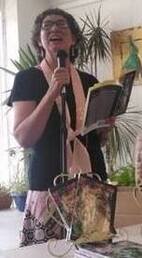 Kyle Laws is based out of the Arts Alliance Studios Community in Pueblo, CO where she directs Line/Circle: Women Poets in Performance. Her collections include Ride the Pink Horse (Stubborn Mule Press, 2019), Faces of Fishing Creek (Middle Creek Publishing, 2018), This Town: Poems of Correspondence with Jared Smith (Liquid Light Press, 2017), So Bright to Blind (Five Oaks Press, 2015), and Wildwood (Lummox Press, 2014). With eight nominations for a Pushcart Prize, her poems and essays have appeared in magazines and anthologies in the U.S., U.K., Canada, and Germany. She is the editor and publisher of Casa de Cinco Hermanas Press. Jeff Ruane CC PROJECTOR I was twelve years old when I first wished to die. Before the depression I wore red lipstick, smeared it all over dollar pizza & coffees drenched with caramel. Baltimore couldn’t handle a hurricane, I packed my possessions quietly & took the devastation elsewhere. Tonight I learned a little more about butterflies as a friend and I giggle our way down the High Line, drinking in Chelsea’s lights. I go home and gaze at my reflection in a Coca Cola can & god I hope I’m beautiful. I’m beautiful, damnit, as breathtaking as Baltimore City’s lights trickling through the obsidian mouth of the Chesapeake. In this lifetime I am now nineteen & throwing pebbles into the water, watching how reflections ripple against the night’s sky. A butterfly lives up to a week, the ones that migrate a little longer, says the struggling actor working at Chelsea Market in between our chatter about theater. A butterfly with its wings decapacitated and placed in a bell jar is considered art. I hope I become rain instead, the tributaries draining between your fingers. Rituals we lay my sister among the dahlias and watch as the petals turn a light red even accidents can be constructed to become perfect little mistakes Baba grabs the canister of gasoline but Maman screams and flails as she reaches for his heartbroken hands No, she is still my daughter! she cries, throwing her trembling figure over the corpse Maman’s dress drapes over sister the same way her heart died with her there’s no tears left in me to cry alongside with Maman’s unsettling grief but Baba still lights the match and underneath the night sky I cover my brother’s eyes as the inferno consumes us 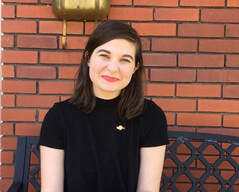 Ashley Hajimirsadeghi’s work has appeared in Into the Void Magazine, Corvid Queen, among others. She is a poetry reader at Mud Season Review, attended the International Writing Program’s Summer Institute, and was a Brooklyn Poets Fellow. She can be found at ashleyhajimirsadeghi.weebly.com 6/4/2020 1 Comment Poetry by Sean Cho A. Sean Cho A. is an MFA candidate at the University of California Irvine. His work can be ignored or future-found in Salt Hill, The Portland Review, Hobart, and elsewhere. He is a staff reader for Ploughshares. In the summer of 2019 he was a Mary K. Davis scholarship recipient for the Bear River Writing Conference. Sean’s manuscript Not Bilingual was a finalist for the Write Bloody Publishing Poetry Prize. Alexander Rabb CC Late Summer, 4:23 am The night yawns open-mouthed and quiet. Outside the window, the gasp of dawn, the opposite of a cliff; a swallowing darkness, a precipitous fall into Light. Below the horizon the sun hangs like a threat. I can smell it. There is a lunar calendar in the soft meat of my belly. I count each tiny moon my fingernails left behind. Years pass or something like a year. Something like a wave swells in my throat and subsides. Low tide and I am a tangle of salt and bone. Seagrass threatening to turn putrid in the heat if this stinging sea of moonlight does not break for me. I shred the sheet and hang a thousand white flags in the window. They wrap themselves around me like bandages, turn bloodred like the dawn that is just as feral as I am. Tooth nail and wrist. Outside the smell of cigarettes through the open window. A car drives past without hurry. A dog yelps softly and goes back to sleep. Eve, Drunk Again If I break everything, then nothing is really broken anymore, is it? Everything is just a crosssection of itself a biopsy of the butterfly who tore itself to pieces (as butterflies are wont to do at the beginning and the end of things). Look God, I made a bouquet of it. Look, I reinvented flowers so I can grow my own garden. I can grow apples. I can grow pomegranates and you will not be welcome there anymore than I am.  Rachel Grace Mussenden is a poet living and working in Philadelphia, PA. No longer spending her waking hours arguing with strangers in bars, she is a firm believer in long showers and grapefruit seltzer. Other work can be found in The American Journal of Poetry, and is upcoming in Glass: A Journal of Poetry. Ben Seidelman CC Sada Do Pal Da Hai Saath, Karachi Ammi used to say read between the lines of a book, lights of a city, blights of the suffering, silences of the translations, she said “Never close your eyes to or for anything,” But I close my eyes now, Karachi. Have you been living in them? No? Then why are they teary? Why do I see the reflection of your coast littered with lovebirds, rubbish, camel and horse rides, and more rubbish? You are an angry, unruly, childish wish and I try. I try to get rid of you but even when I sleep, you’re awake in my mind. Sin city, you’re a background color, a purple bruise, jelly tears, there is no truce. I miss the hooting, oil slick cheese parathas in the pan, ludo on the table, howling of the men and owls outside my apartment. I write lies when I say I like the crickets here, “Oh hell no!” as Baba would say when the bowler would miss a wicket. I like cricket, Karachi why can’t I like crickets? Karachi, sometimes I feel that I carry your sea in my arms, sprinkling your water when I leave footprints all over towns. But whatever shape my hands take in reincarnations, the water keeps falling through with memories of you — why is your water a wanderer, saathi? Here’s some piping hot tea, Karachi, you’re my fisherman and I scream: “Fisherman, my fisherman I’ve lost my way!” Compass gone, I can no longer navigate these waves of misery. My mirage of hope, won’t you save me? Keep all your lights on Karachi, I cannot see. One day, I’ll find my way back because you see, my fisherman you can’t save me, “You siren you,” as Bari would say, you’re far away, oh you were never there, only I was, with a shadow, which stuttering people called my name. Translations – Transliterated Urdu to English: Title = We have a two-moment companionship Karachi Ammi = Mom Baba = Dad Bari = Literally means older or bigger (feminine), but in my poem, it’s a pet name for my older sister Paratha = Flatbread, originated in the Indian subcontinent. Ludo = Board game, common in South Asia. Saathi = Companion/Partner Note: The title is transliterated from Punjabi.  Hafsa Zulfiqar (she/her) is an international student from Pakistan at Bennington College, studying literature, psychology and teaching a master class on perpetual procrastination. She's a polyglot and speaks five languages fluently and is working on the next four. You would think that would make her a master in expressing emotions via words but she still remains an amateur sassafras. You can find her on Twitter and Instagram @vibingwithabook 6/4/2020 0 Comments How To by Despy Boutris Ben Seidelman CC HOW TO after Natalie Shapero How to learn to not turn back. How to step forward into the puddled grass. How to define want without saying windstorm. A windstorm of want. A windstorm of sweetgum leaves. A windstorm of thoughts beating, When will, when will, when will I learn? As if we ever really stop. Often my friends must remind me that adulthood doesn’t mean done or stable or happy. I must remember that, like leaves, we fall. If we can ever afford a house, let’s start a garden. I have never been afraid of dirtying my hands.  Despy Boutris is a writer. Her work is published or forthcoming in American Poetry Review, Southern Indiana Review, Copper Nickel, Colorado Review, The Adroit Journal, Prairie Schooner, and elsewhere. Currently, she teaches at the University of Houston, works as Assistant Poetry Editor for Gulf Coast, and serves as Editor-in-Chief of The West Review. 6/4/2020 0 Comments Poetry by Joan Glass Mayastar CC Grief in Quarantine For Julia If she were alive now, I could try to love her the way I am told to love everyone now: guardedly, and from a distance. Maybe I could keep her safe. But if I’m being honest, I would probably quarantine her too hard, bolt the doors, crush her against my ribs until the fever set in. She would die anyway, and I would too. Both of us using our last breaths to wish for an actual way to love someone and stay alive. The Memory of Water When salt lakes disappear, you can wander for miles across the memory of water. Unless you’ve experienced it, you don’t know that when the lake dries up, you can still drown. In my kingdom of salt, driftwood litters the crystal field like the scattered bones of unnamed monsters. Their broken teeth line the boardwalk. Boats transform into the stilled rocking chairs of grieving mothers. The sky, formerly a pretty veil, now resembles a fortress of locks, one for each day here without you. A disoriented man wanders along the shore, turning over shells with a stick. Maybe he searches for signs of life. Or perhaps, for a shallow pool of keys. How to Make Pancakes for a Dead Boy For Frankie First, crack the egg into a sinkhole of grief. Measure the ingredients, then stir, until the lumps no longer resemble bullets. Try not to see him standing at your side grinning at age six, front teeth missing, pulling on your sleeve to whisper with a grin: “Auntie, please add extra chocolate chips.” Run the electric beaters. until you can no longer hear his voice as a toddler or the snap and boom of the first and last shot he would ever fire. Pour the batter onto the griddle, and while the pancakes rise, read his suicide note again. Try to make sense of it and get nowhere. Cut the pancakes into bite-sized pieces. Sweeten the plate as you scream.  Joan Glass lives near New Haven, Connecticut. She lost her 37-year old sister and her 11-year old nephew to suicide in 2017, and is working on a collection of poems about those losses. Her poems have been published or are upcoming in The Fem, Rise Up Review, Black Napkin Press, Dying Dahlia Review, The Missing Slate, Vagabond City Lit, TRIVIA: Voices of Feminism, Literary Mama, Easy Street, and Right Hand Pointing, among others. Her poem “Bathing Scene” was featured on the Saturday Poetry Series: Poetry as it Ought to Be, and her poem “Cartouche,” was nominated for a Pushcart. 6/4/2020 0 Comments Poetry by Alec Solomita Ben Seidelman CC
Therapist Nathan Seidman is what they call these dark days, “a lovely man,” foam-soft, voice like loam, like the shuffle of leaves in September. He understands what he understands and waits while you roll out your griefs and nimbly transmutes them. He leans back in his ergo (knows a little Latin), resting his hands on his modest paunch, this young- looking, sweet-faced, boy-man with a Ph.D. You pause, he shifts, and in a voice like mayonnaise says, “What I hear you saying is …” somewhat different from what you said. He loves when you cry, makes little noises of sympathy, rolls toward you on his chair, too close for the comfort that’s his aim, mewing like a kitten. Lovely man. Rain Dove Also known as mourning dove for its muted, round croon, one of our most bountiful birds. Pale feathered, slender, sometimes spotted, it was your favorite. And when you were a girl, your favorite aunt, a doggedly cheerful sort, teased and teased, saying, “You would love that sad old singer!” Well, your mother was gone and so I guess you would. When the rain dove takes flight its wings sing a different song, a whirring kind of song. Alec Solomita’s stories and poems have appeared in many publications, including The Adirondack Review, The Southwest Review, The Galway Review, MockingHeart Review, Anti-Heroin Chic, The Blue Nib, and Bold+Italic. He was shortlisted by the Bridport Prize and Southword Journal and longlisted by the Over The Edge New Writer Contest 2019. More recently he was longlisted for the erbacce-prize 2020. His poetry chapbook, “Do Not Forsake Me,” was published in 2017. He lives in Massachusetts. 6/4/2020 0 Comments Poetry by Elizabeth Mercurio Jeff Ruane CC
Counting Buddhas After dawn the light splits through palms like wisps of mist that smoke the star jasmine. The Buddha sits ordered calm by the breeze and the honeymoon songs of starlings. I count all of the Buddhas in the garden. Twenty-five to quiet me. There is no one to protect us. No one saves us but ourselves Courage begins on a wing of words, a winding walk along the narrow herb scented path. Cherry blossoms offer a pale square of heaven. A circus of butterflies burst into your name. The tender creek calls you. Don’t torture yourself. Never mind the uncertain future, the hidden meanings of things, Right now, your feet are cold in this creek And there are still lilacs in the back yard. Elizabeth Mercurio earned an MFA in poetry from The Solstice Low-Residency Program of Pine Manor College. Her work has appeared in Third Point Press, Philadelphia Stories, The Skinny Poetry Journal, The Literary Nest, Fledgling Rag, Martin Lake Journal, and the Lily Poetry Review. She was nominated for a Best of the Net nomination and was the 2016 recipient of The Sharon Olds Fellowship for Poetry. Her chapbook, Doll is currently available from Lily Poetry Review Books. |
AuthorWrite something about yourself. No need to be fancy, just an overview. Archives
April 2024
Categories |
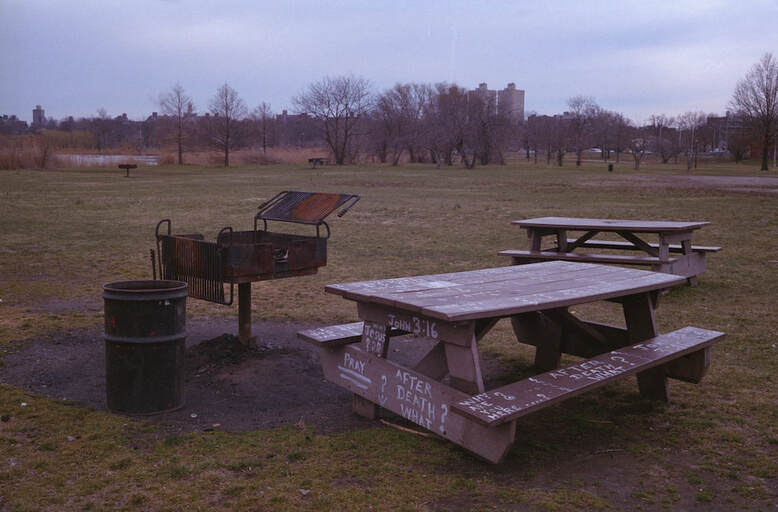

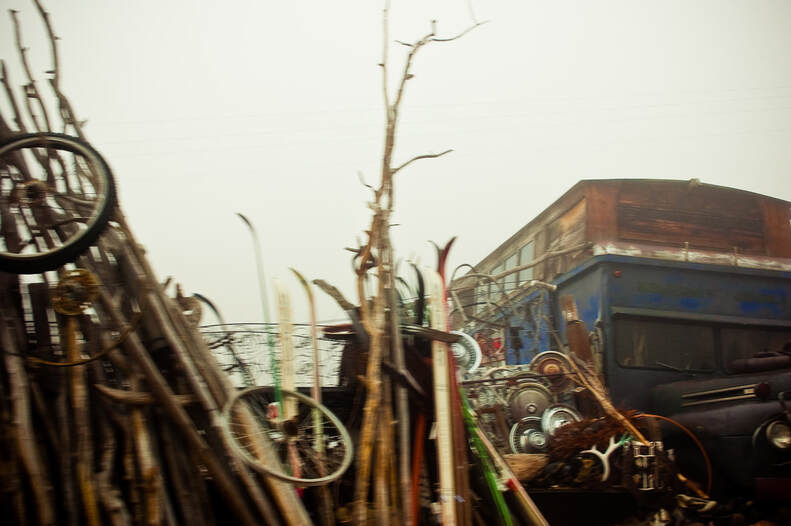
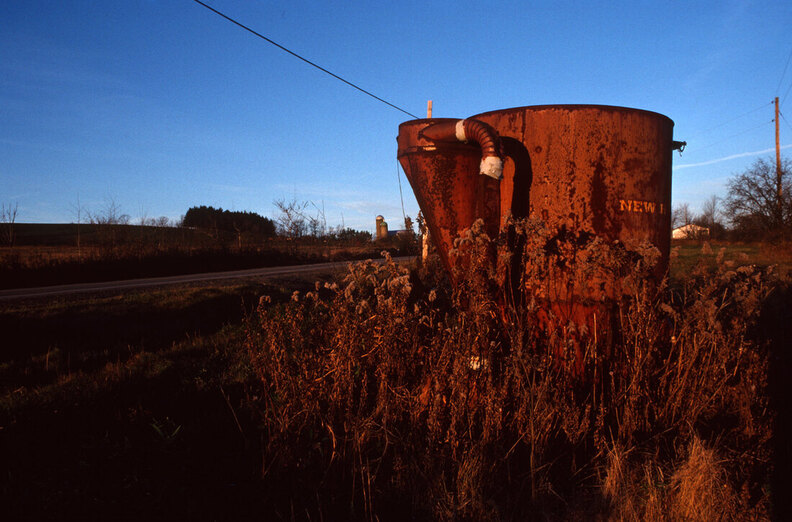

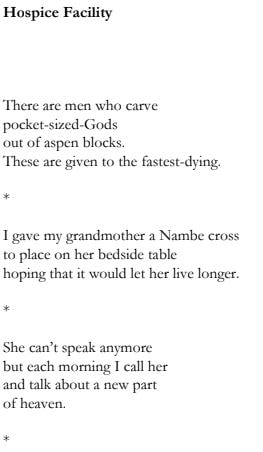
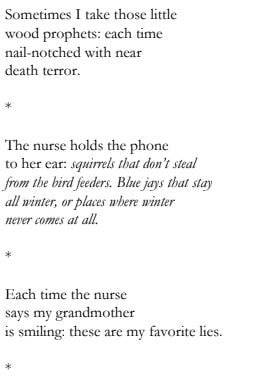
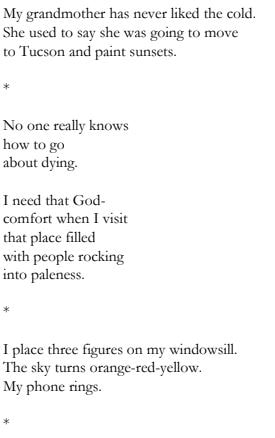
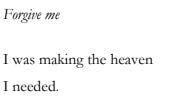
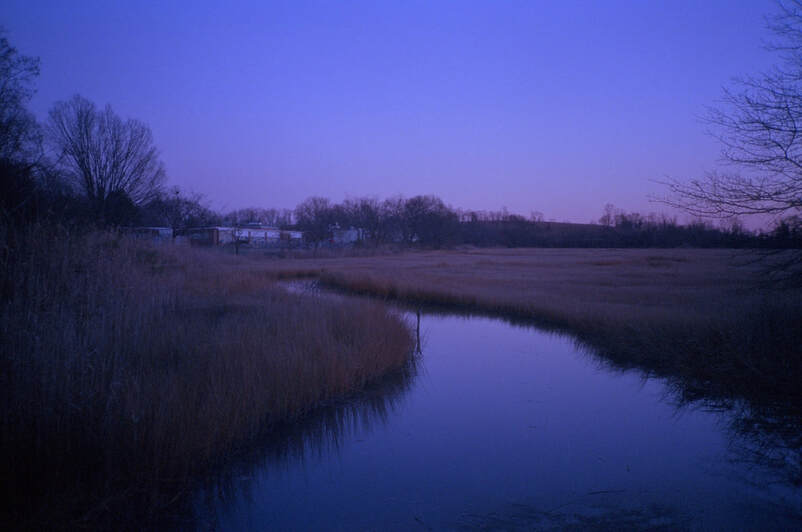
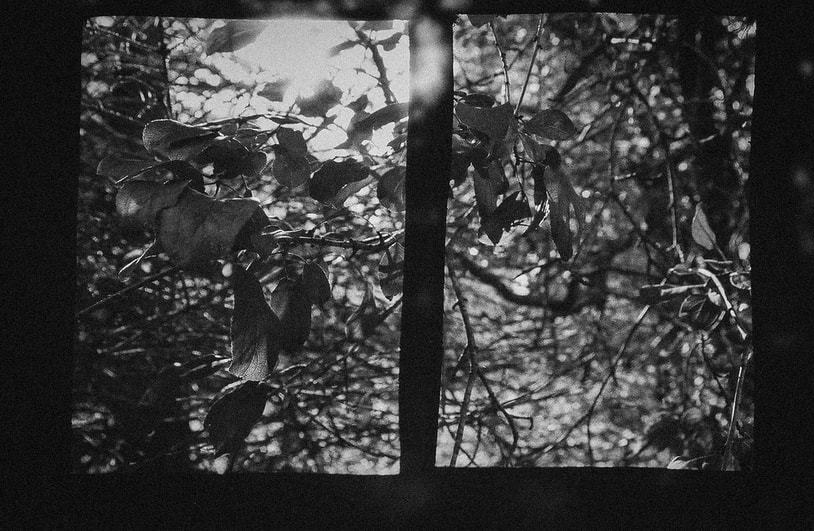
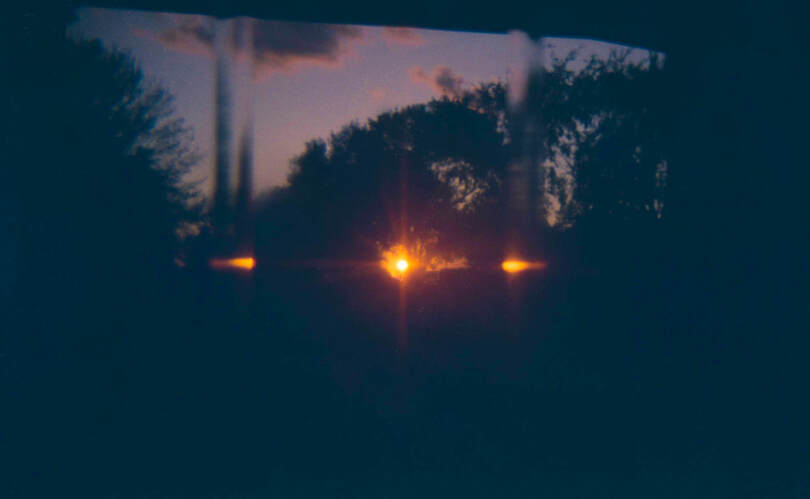
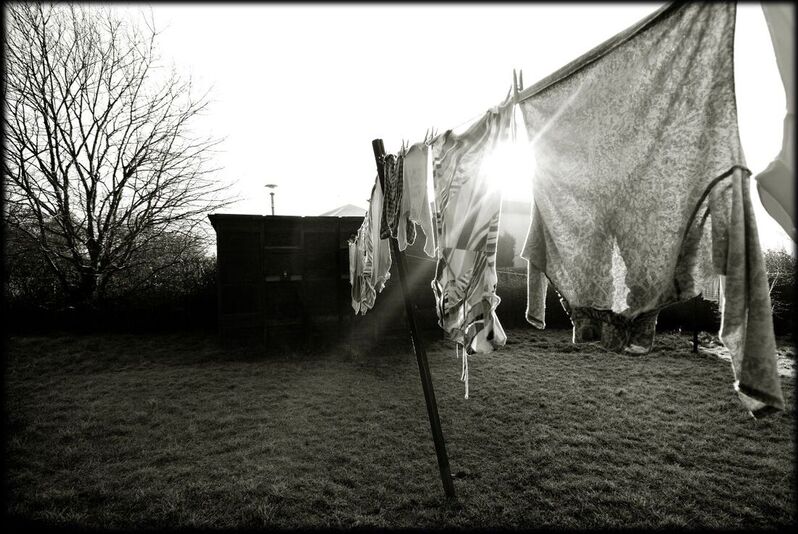

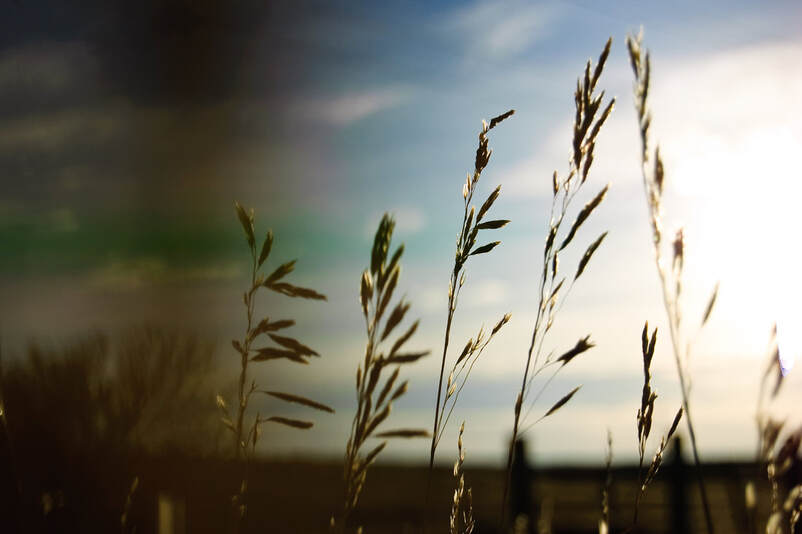
 RSS Feed
RSS Feed
